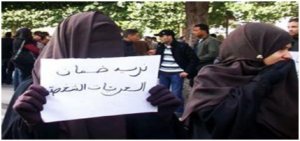Tunisian Court: Women Who Wear Niqab Have a Right to Education

Before the January 14 Revolution in Tunisia, wearing the hijab or niqab was categorically forbidden. The Ben Ali regime considered them “sectarian dress”, a term that the regime at that time applied to anyone who wore a niqab, hijab, or any other clothing with religious significance. To that end, they passed an ordinance, known as Ordinance No. 108, that forbade the wearing of “sectarian dress” in public places, streets, schools, and in universities. The ordinance contained instructions to ban the wearing of the niqab and hijab, and to take steps against any person wearing such attire. It was only after the 2011 revolution that the phenomenon of wearing the niqab became widespread among the ranks of a broad segment of Tunisian women. Since then, the wearing of the niqab in universities has become a focus of both social and legal controversy – a controversy that remained unresolved until December 3, 2014, when the Administrative Court issued a ruling on Case No. 125265.
The Social and Legal Controversy Surrounding the Niqab in Universities
The gradual increase in the phenomenon of wearing the niqab in Tunisia after the revolution has resulted in a society–wide debate about the wearing of the niqab in universities. Two incidents in particular divided the Tunisian public between those who supported women’s right to wear niqab, and those who opposed it. The first of these incidents took place in September 2011, and involved Marwa al–Saadi, a student who was prevented from completing registration procedures for the Faculty of Arts and Humanities in Sousse. Shortly thereafter, a group of Salafis stormed the university.[1] The second incident occurred in the Faculty of Arts in Manouba, near the Tunisian capital, at the end of the same year, when a student wearing a niqab was prevented from taking her written exams. A group of Salafi students then held a sit–in to demand that women wearing niqab should be allowed to enter the university.[2]
Reactions to these developments in the halls of Tunisian universities were varied and numerous, and split the Tunisian public into two camps. The first sees the niqab as an intrusion upon Tunisian customs and traditions, and as a barrier to one of the most important components of collective living: to know the other and to interact with them. This group called for the niqab to be banned. The second camp is represented by a number of rights organizations, such as the Association for Liberty and Equality and the National Council on Liberties, which view the niqab as a matter of personal freedom no difference from other freedoms granted to the individual. They are calling for the protection of the right to wear the niqab.
The Ruling in Response to the Request for a “Stay of Execution”
The controversy surrounding the niqab was transferred to the halls of the courts when student Marwa al–Saadi resorted to the Administrative Court, filing a request for a “stay of execution” regarding the university’s decision. Her case (No. 413983) was ruled upon on December 28, 2011. In that decision, the court confirmed the principle that “while choice of dress is a manifestation of personal freedom, the practice of that freedom, like all freedoms and fundamental individual and public rights, must take into account the regulation and proper functioning of public services”. It held that the official designated by the university’s administration to verify the student’s identity during registration procedures, through verifying the extent to which the identification papers she presented matched the individual, had followed procedure according to the structures currently in place. This fell “within the range of regulations required for the proper functioning of the public service of education, and for the preservation of the students’ own interests”. At that time, the First President of the court rejected al–Saadi’s request for the “stay of execution” on this basis. Yet the court ruling’s refusal to stop the implementation of the decision did not settle the issue from a legal standpoint, as the “stay of execution” that was requested falls under exceptional and precautionary measures. Moreover, the decision was made based on viewing documents in a file, rather than an in–depth investigation into the case.
An Advisory Opinion Resolves Nothing
The issue was brought before the administrative judiciary a second time when a request was made for a special advisory opinion that the government requested from the advisory chambers of the Administrative Court. The request concerned the possibility of regulating the wearing of the niqab on university campuses through internal [university] procedures and structures. The court issued Advisory Ruling No. 491 on January 10, 2012, in which it affirmed that regulation of the issue of wearing the niqab within the university lies with the university’s deans. It also confirmed the necessity of striking a balance between the necessities of maintaining properly functioning public services and “the freedom of belief and dress that belong to all those who are using those public services.”
Despite the controversy this advisory opinion caused at the time, it did not settle the issue, either – as its subject was limited to defining which authority was designated to regulate or ban the matter of the niqab within universities. Moreover, such advisory opinions from this court are non–binding for the government, judicial departments, and even the court itself.
A Ruling Consecrating the Right to Education for Women Wearing Niqab
The issue of wearing the niqab in universities was only settled with preliminary Ruling No. 125265 from the second instance of the administrative judiciary on December 3, 2014. This ruling addressed the case that Marwa al–Saadi had brought against the Dean of the Faculty of Arts and Humanities in Sousse. It ruled to nullify the decision to reject her enrollment, which had been made in accordance with the October 6, 2011 ruling of the Faculty Council forbidding women who wear niqab from attending university grounds.
According to the presented facts of the case, after the plaintiff had successfully passed her baccalaureate exams she took steps to enroll in the Faculty of Arts in Sousse, specializing in a bachelor’s degree in Arabic Language, Arts, and Culture. However, the administration refused to enroll her in view of the fact that she wore a niqab, and on the pretext that this made it impossible to know her identity. In spite of the fact that she presented her academic records along with her national identity card, and she was willing to show her face to any woman, the administration insisted on maintaining its position and refused to admit her.
On October 6, 2011, the Faculty Council of the Faculty of Arts decided to deny access to students wearing the niqab to university grounds, whether to register, attend classes, or write exams. This was what prompted the appeal to nullify this decision, based on the premise that the decision being challenged violated the Constitution as well as international conventions. The appeal stated that wearing the niqab is included within freedom of dress, freedom of belief, and the freedom to practice one’s religion, which are guaranteed both in constitutions and international conventions. In particular, Article 18 of the Universal Declaration of Human Rights states that everyone has the right to express his or her religion and beliefs through learning, practices, and acts of religious observance, whether alone or in a community with others. Likewise, Article 26 states that every person has the right to education. Thus, as the appeal pointed out, in addition to violating the principle of equal access to public services, the university’s decision to prevent enrollment [on this basis] deprives an entire category of Tunisian women from their lawful right to education.
In its preliminary opinion, the court affirmed that “whereas in the absence of a stipulation authorizing the administration to ban women wearing niqab from enrolling in universities…its decision ruling to forbid the plaintiff from enrolling has no legal basis”. It directed that the challenged decision be nullified, and the plaintiff be admitted on this basis.
It can be understood implicitly from the ruling that freedom of dress is a manifestation of personal freedom, and exercising that freedom is a matter like that of any other fundamental rights and freedoms, individual and public, that are guaranteed by the Constitution and by international convention; they cannot be restricted except by legal means. The court confirmed that in the absence of a law limiting the freedom to wear the niqab, it was impossible to restrict this freedom with merely a decision issued by the Dean and Faculty Council.
The importance of the ruling lies in its implicit grounding in the Constitution and international treaties, upon which the plaintiff based her case – affirming the Administrative Court’s established principle of consistently monitoring the compliance of administrative decisions with international treaties that [Tunisia] has signed onto.
As the first of its kind, this ruling ended a longstanding controversy in the Tunisian legal sphere, and within civil society regarding the right to education of women wearing niqab. The ruling implicitly establishes freedom of dress, while explicitly refers to the right of education; and, while it affirms that this freedom is not absolute, it also stipulates that restrictions must be lawful and not merely administrative decisions. It is worth mentioning here that the Tunisian Constitution, while establishing the possibility of restricting the rights and freedoms it guarantees, states the condition that the law cannot infringe upon the essence of those rights.
The court’s ruling implies, then, that the exercise of freedom of dress and of religious belief must remain within the limits of the demands of public services. The most important reason for the court’s nullification of the decision to reject the student’s enrollment was her recognition of the need to ensure proper provision of public services, and her willingness to reveal her face to any woman in the faculty’s administration or to any of its female students.
It is worth pointing out that the issue of wearing the niqab prompted a similar controversy in France when a law was passed banning the niqab from public places. The legitimacy of that law was questioned at the European Court of Human Rights. In a ruling issued January 7, 2014, the court confirmed that the law banning the niqab does not infringe on public freedoms and human rights, and that the ban appears to be in balance with its intended goal – the preservation of communal life. Governments are thus permitted to ban the wearing of the niqab in public places. The ruling has provoked extensive debate, and has been the focus of criticism from major rights organizations like Human Rights Watch.[3] The position of the [Tunisian] Administrative Court on Case No. 125265 is thus a contrast to that of the European Court of Human Rights; the Tunisian decision does more to protect rights and freedoms.
One may regard the Tunisian ruling as the latest installment of jurisprudence that the administrative judiciary has been creating to protect basic freedoms, particularly freedom of belief and the related freedom of dress. Social and legal controversies about freedom of dress and restrictions on the exercise of that freedom have resurfaced recently, with the case of a female flight attendant who was banned from working on Tunisair flights.[4] We hope that the court’s ruling will play a critical role in these longstanding controversies.
This article is an edited translation from Arabic.
__________
[1] See: “200 extremists storm faculty in Tunisia in defense of niqab wearer prevented from registering”, France24, October 8, 2011.
[2] See: “Flareup in Manouba between faculty dean and women wearing niqab dispersed only through army presence”, al–Hasri, November 28, 2011. http://www.alhasri.com
[3] See: “European Court of Human Rights supports niqab ban in France”, Euro News, July 1, 2014.
[4] See: “Special: after banned from working on Tunisair, muhajaba flight attendant speaks with Assabah News”, Assabah, April 24, 2015.



